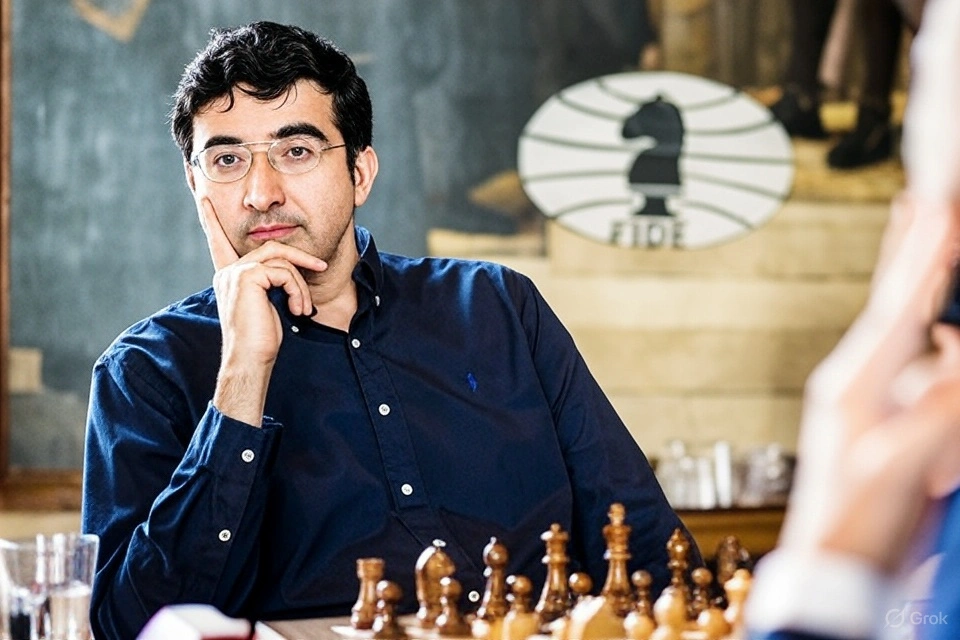The International Chess Federation (FIDE) has launched a rare and serious disciplinary case against former World Champion Vladimir Kramnik. FIDE itself is the complainant, accusing Kramnik of repeatedly harassing and insulting Grandmasters Daniel Naroditsky and David Navara over the past two years. The case is now with the FIDE Ethics & Disciplinary Commission (EDC), and the chess world is watching closely to see what penalties he might face.
What the Complaint Is About
FIDE’s complaint centers on accusations of “harassment” and “insulting an individual’s dignity.” The Ethics Code requires all FIDE members to respect others and bans any kind of abuse. Article 6.3 and Article 6.4 both underline that dignity must be protected and that harassment—whether physical, professional, or verbal—is strictly prohibited.
If the EDC rules that Kramnik’s public comments and repeated allegations crossed this line, the case then moves under the Disciplinary Code. That’s where the actual penalties are defined.
Possible Penalties: Fines and Bans
Under Article 13.1, the EDC can issue everything from a warning to a long-term ban. But because FIDE’s complaint describes a “pattern of conduct” lasting about two years, the Commission could choose tougher sanctions.
Two are especially important:
1. Fines:
The EDC can issue a fine of up to €50,000. This is often used when a person damages someone’s reputation but a full ban is considered too harsh.
2. Bans:
Article 13.1(d) allows a ban from all chess competitions and related activities—playing, organizing, coaching, commentary, or acting as an arbiter. These bans can last from one month to 15 years.
A long ban would essentially remove Kramnik from the official chess world.
Rules on Making Accusations
A major part of the case involves Kramnik’s public claims suggesting other players might be cheating. The Code is very clear about this:
- Article 11.6(a) bans “false or unjustified accusations.”
- Article 11.7(f) specifically forbids “reckless or manifestly unfounded accusations of chess cheating” unless the accuser has reasonable evidence.
If the EDC decides that Kramnik’s statistical arguments about Naroditsky or Navara were not scientifically sound or lacked proper justification, these articles give the Commission a direct basis for sanctions.
Aggravating Factors
When deciding how severe a punishment should be, the EDC will look at how serious the actions were and how much harm they caused. The rules also say that a “lack of remorse” or repeated behavior can increase the penalty. Even if Kramnik has no prior convictions under the Code, the alleged two-year pattern could count as repeated misconduct.
In serious cases, penalties can even be doubled.
Possible Additional Sanctions
Beyond fines and bans, the EDC can impose “Supplementary Sanctions,” such as requiring the offender to perform up to 12 months of service that benefits the chess community.
The commission can also issue a suspended sentence. This means the punishment is delayed, and Kramnik would be on probation for six months to three years. If he breaks the rules again, the original penalty automatically takes effect.
What Standard of Proof Applies?
Kramnik may argue that his comments were protected speech or that his analysis was valid. But FIDE does not use the “beyond a reasonable doubt” standard. Instead, the Commission uses a lower threshold called “comfortable satisfaction.” This is stricter than just “more likely than not,” but far below the level used in criminal courts.
I’m the senior editor of Attacking Chess, a keen chess player, rated above 2300 in chess.com. You can challenge me or asking questions at Chess.com.

